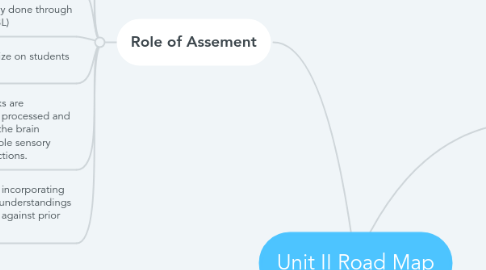Unit II Road Map
by Austin Claseman


1. Role of Assement
1.1. The classroom is not a democracy and not every student will have an equal roles and power.
1.2. Curriculum planning begins with assessment.
1.3. Grades can reduce intrinsic motivation and quality of thinking. (Kohn)
1.3.1. Grades should not circumvent the material
1.4. Authentic Learning is usually done through Project Based Learning. (PBL)
1.5. Teachers should capitalize on students "play" energy.
1.6. Hands-on, experiential tasks are multi-sensory and are then processed and stored in multiple parts of the brain simultaneously using multiple sensory systems and executive functions.
1.7. True knowledge involves incorporating concepts into one’s own understandings which is then juxtaposed against prior knowledge.
2. Active Student Engagement
2.1. Flow: state in which people are so involved in an activity nothing else matters
2.1.1. In pedagogy, this is called engagement.
2.1.2. Can lead to happiness and apathy.
2.2. Curriculum should be designed to allow flow.
2.2.1. Zone of Proximal Development.
2.2.2. Students may carry in baggage that affects the curriculum, so it needs to be changed to fit them.
2.2.3. Our job as teachers to reach out to them.

